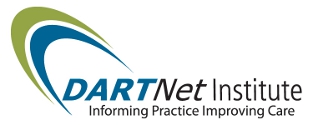

DI is a robust integrated collaborative of the premier primary care research networks in the U.S. that:
- Provides rapid bench to real world practice dissemination and implementation
- Provides valuable data for community health planning
- Builds an engine and backbone for specialty and trans-disciplinary research
- Seamlessly integrates disparate multi-source data into actionable information to support and optimize decision-making
- Encourages multiple levels of bi-directional communication between and among clinicians, researchers, patients and networks
:: Contact Us Today
Learn more about how you can help keep this momentum building. Contact Turner White, DI President, at Turner.White@Rockhurst.edu
Ways to Partner > Fund DI
Fund the DARTNet Institute
We are looking for individuals, foundations, and corporations who are interested in moving forward the innovative work of DI by funding the Institute. Email Turner White, DI President, for more information.
Options for funding DI include but are not limited to:
- Enable capacity-building for the organization, for example:
- Technological capabilities
- Strategic-planning
- Defining the Learning Community capacity and process
- Patient Engagement process, including methodological and technical
- Disease-specific research endeavors, for example:
- Mental and behavioral health
- Asthma and COPD
- Diabetes
- Chronic kidney disease
- Process-specific research endeavors, for example:
- How to integrate evidence-based guidelines into practice
- How to implement the Patient-Centered Medical Home
- How to integrate a fitness-orientation into primary care
Reading for Those Considering Funding DI
Why You Should Consider Funding DI
The work of the DARTNet Institute can make a real and significant difference in the quality of healthcare provided in the United States. Consider this summary of the current state of healthcare quality and research:
Despite four decades of proposed fixes, and tourniquet solutions, the quality of the U.S. health care system ranks 37th in the world. Yet the last decade’s large and widespread investment in health information technology now presents an unprecedented opportunity for our healthcare system to regain stature, quality, value, and efficiency. We are now on the cusp of harnessing our robust infrastructure of health information technology to shift the trajectories of cost inflation and quality improvement.
The large amount of data produced through health information technology provides a canvas for examining what works in our healthcare system. Linking the datasets produced from electronic health records and claims processing can provide important information to help patients and providers make more informed decisions, reduce waste, and improve quality. This type of research, known as comparative effectiveness research, uses large data sets to compare different drugs, devices, surgical interventions, behaviors, and delivery strategies head to head in real world settings, to determine the most effective approach to a given illness or condition and evaluate novel therapies against evolving guidelines and outcomes.
Comparative effectiveness research raises the clinical decision-making bar, providing evidence to patients, clinicians, and other decision-makers to help them choose optimal treatments. It can also help to forecast costs associated with new treatments/ products/ technologies. It rises above historical preference, loyalty to a specialty, and perceived value to help us move from eminence-based practice to evidence-based practice, generating better outcomes.
Comparative effectiveness research can provide this evidence, yet there still remains a critical need to disseminate findings and facilitate rapid learning from both scientific inquiry and organization-to-organization collaboration.
The promise and importance of such inquiry has long been recognized by primary care clinicians and practiced within their daily work environments. As the distinguished researcher Lawrence Green, Dr. P.H., aptly noted, "If we want more evidence-based practice, we need more practice-based evidence."
The recent interest in comparative effectiveness and translational research has further promoted the need for answers derived from real world settings. Effective and efficient primary care is widely recognized as essential to a high value, cost effective health care system. Efforts that support primary care’s improvement, ongoing development, and innovation in the United States are central to health care reform and health status improvement.
The DARTNet Institute is now working to cultivate and incorporate an expanded variety of disciplines, including a wider range of specialties, researchers, funders and other private partners. While an ad hoc system of collaboration has demonstrated the ability to attract research grants from federal, foundation and industry sources, the final success of the organization will be determined by how well it adds value to its expanding base of member organizations. To add value, DARTNet must provide feedback, innovation, and interactive learning – vital activities not typically funded through research grants. Thus, DI seeks like-minded partners who are committed to helping advance this vision and shape its future. We hope you will carefully consider the opportunity to become one of our partners.
Together, we can improve the health of all people.